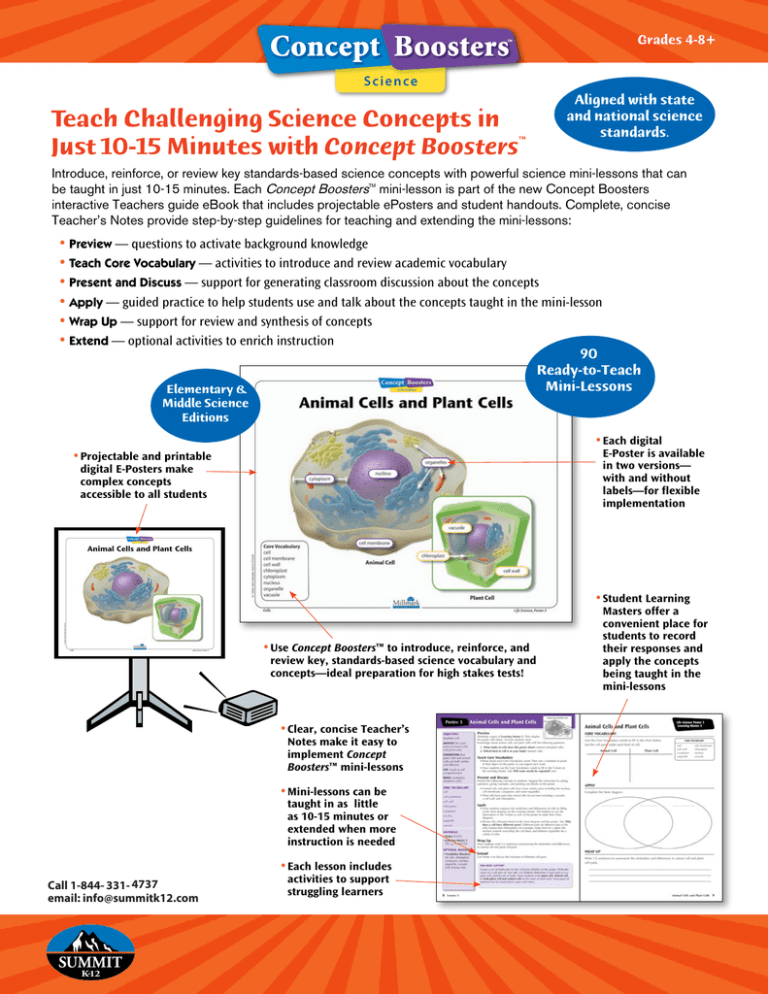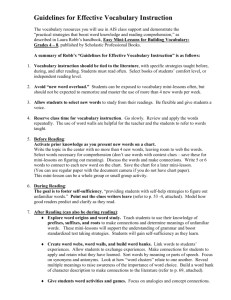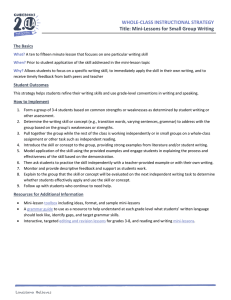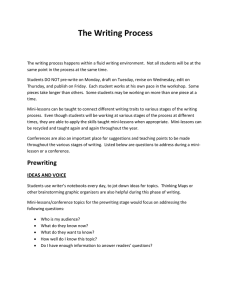Teach Challenging Science Concepts in Just 10
advertisement

Grades 4-8+ » 4DJFODF Teach Challenging Science Concepts in Just 10-15 Minutes with Concept Boosters™ Aligned with state and national science standards. Introduce, reinforce, or review key standards-based science concepts with powerful science mini-lessons that can be taught in just 10-15 minutes. Each Concept Boosters mini-lesson is part of the new Concept Boosters interactive Teachers guide eBook that includes projectable ePosters and student handouts. Complete, concise Teacher’s Notes provide step-by-step guidelines for teaching and extending the mini-lessons: TM • Preview — questions to activate background knowledge • Teach Core Vocabulary — activities to introduce and review academic vocabulary • Present and Discuss — support for generating classroom discussion about the concepts • Apply — guided practice to help students use and talk about the concepts taught in the mini-lesson • Wrap Up — support for review and synthesis of concepts • Extend — optional activities to enrich instruction 90 Ready-to-Teach Mini-Lessons Elementary & Middle Science Editions • Each digital E-Poster is available in two versions— with and without labels—for flexible implementation • Projectable and printable digital E-Posters make complex concepts accessible to all students • Student Learning • Use Concept Boosters™ to introduce, reinforce, and review key, standards-based science vocabulary and concepts—ideal preparation for high stakes tests! • Clear, concise Teacher’s Notes make it easy to implement Concept Boosters™ mini-lessons • Mini-lessons can be taught in as little as 10-15 minutes or extended when more instruction is needed • Each lesson includes Call 1-844- 331- 4737 email: info@summitk12.com activities to support struggling learners Masters offer a convenient place for students to record their responses and apply the concepts being taught in the mini-lessons Each Concept Boosters™ set—for Life, Earth, or Physical Science—offers 30 easy-to-teach mini-lessons on core standards-based science topics. Life Science Concept Boosters™ Set: 30 Mini-Lessons • The Basic Unit of Life • One-Celled and ManyCelled Organisms • Animal Cells and Plant Cells • Parts of an Animal Cell • Mitosis and Cell Division • Cells to Systems • What Makes Up Body Systems • Some Body Systems • Functions of Some Body Systems • Pathogens and Disease • Nutrients You Need • The Food Pyramid • Nonvascular Plants and Vascular Plants • Plant Parts and Their Functions • Plants and Photosynthesis • Photosynthesis and Respiration • Sexual Reproduction in Plants • Asexual Reproduction in Plants • Invertebrates and Vertebrates • Traits Used to Classify Animals • The Classification of Animals • Animal Adaptations • Adaptations Work Together • Endangered and Extinct Animals • Parts of an Ecosystem • Populations and Communities • Types of Consumers • Food Chains and Food Webs • An Energy Pyramid • An Ecosystem’s Resources Change • • • • • Volcanoes Tsunamis Earth’s Atmosphere The Water Cycle Precipitation and Condensation • Temperature, Air Pressure, and Wind • • • • • • • • • • • Light Waves and Sound Waves • Sound • Light Waves and Matter • Refracted Light and Lenses • Light and Color • Electromagnetic Spectrum Earth Science Concept Boosters™ Set: 30 Mini-Lessons • • • • • Ocean Zones Ocean Properties Ocean Tides Ocean Waves Major Ocean Currents Affect Climate • Planets in Our Solar System • Earth Rotates and Revolves • Seasons • The Moon and Its Phases • Other Objects In the Sky • Life Cycles of Stars • Studying the Stars • • • • • • Constellations Distances to Stars Galaxies Earth’s Layers Plate Tectonics Theory Earthquakes Air Masses Weathering and Erosion The Rock Cycle Properties of Rocks and Minerals • Fossils • The Geologic Time Scale Physical Science Concept Boosters™ Set: 30 Mini-Lessons • Matter and Its Properties • Three States of Matter • Changing States of Matter • Atoms and Molecules • Molecules and States of Matter • Atoms and Their Symbols • The Periodic Table of the Elements • Balanced and Unbalanced Forces • Speed, Velocity, and Acceleration • Newton’s First Law of Motion • Newton’s Second Law of Motion • Newton’s Third Law of Motion • Physical Changes, Chemical Changes • Signs of a Chemical Change • Chemical Reactions • Chemical Equations • Elements, Compounds, and Mixtures • Acids, Bases, and pH Kinds of Energy Forms of Energy Heat Transfer Electrical Energy Energy Resources Waves and Their Properties Aligned with ConceptLinks® and Vocabulary Boosters Teacher’s Guide Components • Flash Drive with projectable and printable E-Posters for teaching 30 powerful mini-lessons, digital Teacher’s Guide pages, digital Learning Masters, and complete answer key • Teacher’s Guide with comprehensive Teacher’s Notes for teaching the mini-lessons, plus student Learning Master pages in copymaster format Call 1-844- 331- 4737 email: info@summitk12.com Visit our website—www.summitk12.com—to learn more about Concept Boosters™




